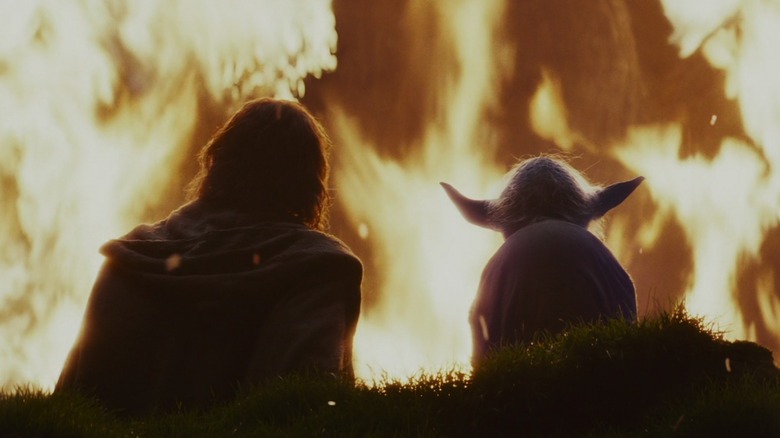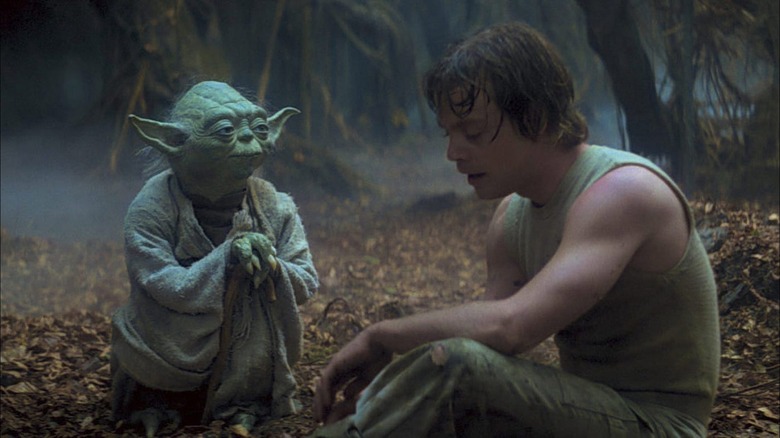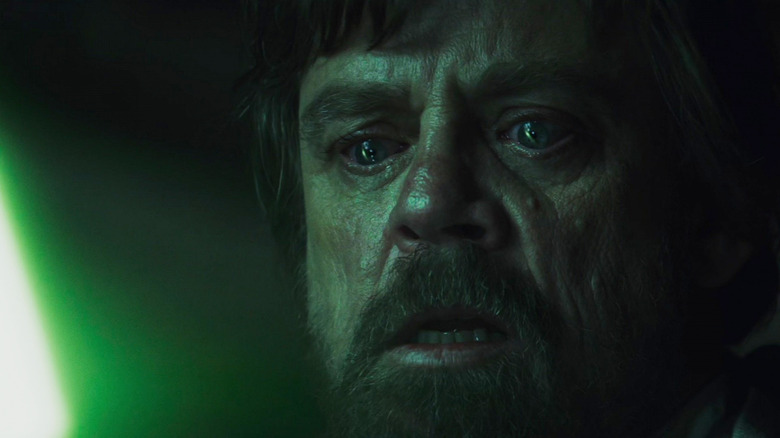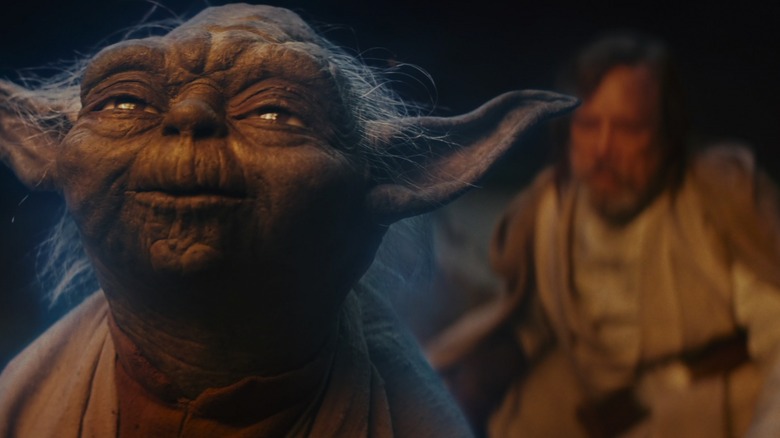Star Wars: The Last Jedi's Yoda Backlash Never Made Sense To Frank Oz
As the line goes, "Nobody hates 'Star Wars' more than 'Star Wars' fans." For a series that encourages viewers of all ages to imagine vast fantastical landscapes and stirring narratives of revolution, it has always drawn the ire of some of its loudest fans. After the original trilogy closed with 1983's "Return of the Jedi," fan negativity has been a constant.
The prequel films in the series, from 1999's "The Phantom Menace" to 2005's "Revenge of the Sith," drew criticism for their staid dialogue, copious CGI, and convoluted plotting, but the fan reaction was worse, and particularly hard on young Anakin Skywalker actor Jake Lloyd. The sequels being even more divisive could only have been predicted by the most jaded observer.
In particular, Rian Johnson's 2017 film "Star Wars: Episode VIII — The Last Jedi," the middle entry of the trilogy, drew extreme criticism. The backlash from some of the series's loudest fans was significant and inflated by various groups gaming the online discourse (or, in the case of one alt-right group, lowering the RottenTomatoes score) to protest the film. No matter the source, the reaction had a major impact on the series. As a result, its followup, 2019's "The Rise of Skywalker" was incoherent and insecure, as if it was trying to win back the most skeptical of viewers.
The negative reaction to "The Last Jedi" came from many different sources, video essays, and online message boards, and above all, it emphasized the movie's lack of fealty to the original trilogy. But it was all in service of tearing down a movie that really didn't seem to warrant it. Certainly, that was the opinion of Frank Oz, the puppeteer and voice actor who played Yoda in the film. As he told Collider in 2018, he "couldn't understand the backlash."
The Empire Strikes Back remix
Anybody watching "The Last Jedi" now might be surprised at the complaints that the movie was disrespectful to the franchise. Much like its immediate precursor, 2015's "The Force Awakens," it playfully remixes most of the tropes fans loved about the franchise's original trilogy. Plot elements, visual motifs, and character arcs are directly drawn from the classics.
If "The Force Awakens" was "Star Wars" in 2015, then "The Last Jedi" was "The Empire Strikes Back" in 2017. Where "Empire" was concerned with Luke Skywalker (Mark Hamill) getting Jedi training from wizened alien master Yoda, "The Last Jedi" switches Luke's role to that of the old master, as he reluctantly trains the conflicted Rey (Daisy Ridley) at the site of an ancient Jedi temple, where he lives in self-imposed exile after a traumatic mistake.
Rey, like Luke in "Empire," undergoes an unconventional training regimen that teaches her to look more deeply into her soul while becoming more acutely aware of her connection to the Force. Like Luke, she also decides to abandon her training early.
Luke is eventually visited by none other than the long-dead Yoda in "The Last Jedi," who appears as a Force ghost. While Yoda was a sophisticated puppet in his appearance in "Empire Strikes Back" as well as its follow-up, "Return of the Jedi" (where he showed up on the advice of child psychologists), and "The Phantom Menace," the other films in the prequel trilogy depicted Yoda as a CGI character (and even threw in a fight scene or two). "The Last Jedi" changed that and paid tribute to the classics by using a puppet.
For Oz, getting the chance to play Yoda as a puppet again after nearly 20 years later was a delight. As he told Collider, he was "so pleased."
Luke Skywalker, an old cynic
Many fans enjoyed the return of puppet Yoda in "The Last Jedi." Still, surely nobody enjoyed it as much as Oz, the veteran puppeteer and voice actor who brought Yoda to life in the first place (in a make-or-break moment for the series). Speaking with Collider, Oz noted that Johnson had a thoughtful reason for using the older, puppet version of Yoda beyond simple nostalgia. "Luke wouldn't know a CGI Yoda," Oz explained. "The only Yoda Luke knew was a puppet character." His arrival on the scene gave Luke a new perspective, but it also resulted in one of the movie's more controversial moments.
As noted by Emily St. James for Vox, Luke's characterization in the movie became a cornerstone of the backlash, particularly in its treatment of him as an "old cynic." Having failed to prevent the rise of the villainous First Order, and the turn of his nephew Kylo Ren (Adam Driver) to the dark side, Luke spends much of the movie in a funk. Seeing something of himself and his nephew in Rey, his struggle comes to the forefront, ultimately resulting in her leaving.
As Yoda explains to a distraught Luke, reeling from the consequences of his failures, the best thing a teacher can experience is knowing their student has found themselves. Using the Force to burn "the sacred Jedi texts," Yoda chuckles at Luke's righteous anger.
Essentially, the movie suggests that Luke being stuck in the past is one source of his misery. The way to go is forward, taking responsibility for your mess-ups and trusting the new generation despite their own failings. For a chunk of the fans that hated the movie, this moral was insulting.
Frank Oz's take on the backlash
Failure is a key theme in "The Last Jedi," and Yoda's scene, as well as Luke's arc, speaks to that. Showing Luke as an "old cynic" had a clear purpose, and Yoda's playful arrival puts a fire under the old hero to ultimately save the day. In putting Luke at his lowest point, it ultimately makes it more satisfying when he gives the Resistance the push to keep going another day. It would have been reasonable to think that Yoda playing such a big part in that moment would be rewarding for fans, but it didn't keep the backlash from occurring.
As Oz told Collider, the backlash was confusing. For him, bringing back Yoda was "like an old glove," and working with Hamill — the man who sold the illusion that Yoda was a real, living thing in the original trilogy — was a major help. His experience working with Johnson was pleasant too (he called the director a "gem"). Unconcerned with the potential controversy the movie could awaken, he focused purely on the merits of the script, saying "That's kind of all I think about."
Watching the movie now, its adoration of the classic "Star Wars" iconography and themes could not be more apparent. It's there in the sentimental parting gift Luke eventually gives to his sister Leia (Carrie Fisher), and it's there in the old-school outer-space dogfighting that kicks the movie off. But it's most visible when featuring Yoda in all his puppet glory.



